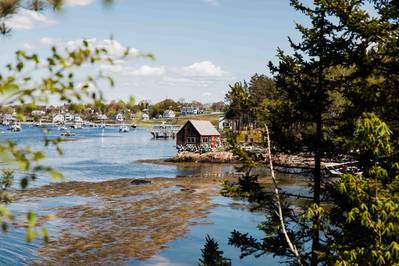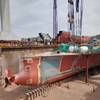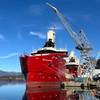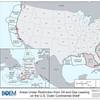Coast Guard to Remove Jacob Pike Wreck in Maine
The U.S. Coast Guard is heading up efforts to raise a 1940s era wooden fishing vessel that sank during a winter storm in the New Meadows River in Harpswell, Maine, on January 10, 2024.
Officials said the 83-foot vessel Jacob Pike is deemed a pollution threat and noted its owner and responsible party (RP) have not taken appropriate action to mitigate the significant threat of pollution.
Coast Guard Sector Northern New England (SNNE) collaborated with Maine DEP, the National Oceanic and Atmospheric Administration, U.S. Fish and Wildlife, Maine Department of Marine Resources, Maine Department of Agriculture Conservation and Forestry (Bureau of Parks and Lands), and the Town of Harpswell, to develop a comprehensive plan to safely and permanently remove the threat posed by the Jacob Pike.
Built in 1949, Jacob Pike spent most of its service life as a commercial fishing vessel in the Maine sardine fishery, but today is inactive, uninsured and has expired certificates.
The total amount of oil on board is unknown, but it is estimated that the fuel tanks can hold 1,000 gallons. After the vessel sank, SNNE’s Pollution Response Team observed significant oil sheening around the vessel and issued a Notice of Federal Interest, along with multiple Administrative Orders, directing the RP to take appropriate action to address the pollution. When it was clear the RP was unwilling or unable to take appropriate action, the Coast Guard issued a Notice of Federal Assumption and assumed control of the response.
The Coast Guard hired pollution removal contractors, who placed floating oil boom around the vessel to contain the spread of the sheen, pumped 400 gallons of oily water mixture out of the submerged vessel, and removed 11 marine batteries. However, the risk of diver entanglement in the interior of the vessel prevented additional recovery efforts. The vessel remains surrounded by boom to prevent the spread of pollution.
The Coast Guard said it has accessed the Federal Oil Spill Liability Trust Fund (OSLTF) to respond to the discharge. The multi-billion-dollar funding source pays removal costs and damages resulting from oil spills or substantial threats of oil spills to navigable waters of the United States. The OSLTF is also available to pay third party claims for certain damages. The RP will later be billed for all federal response costs, which include all costs paid from the OSLTF as well as costs incurred by the agencies themselves, such as Coast Guard personnel and equipment.
















